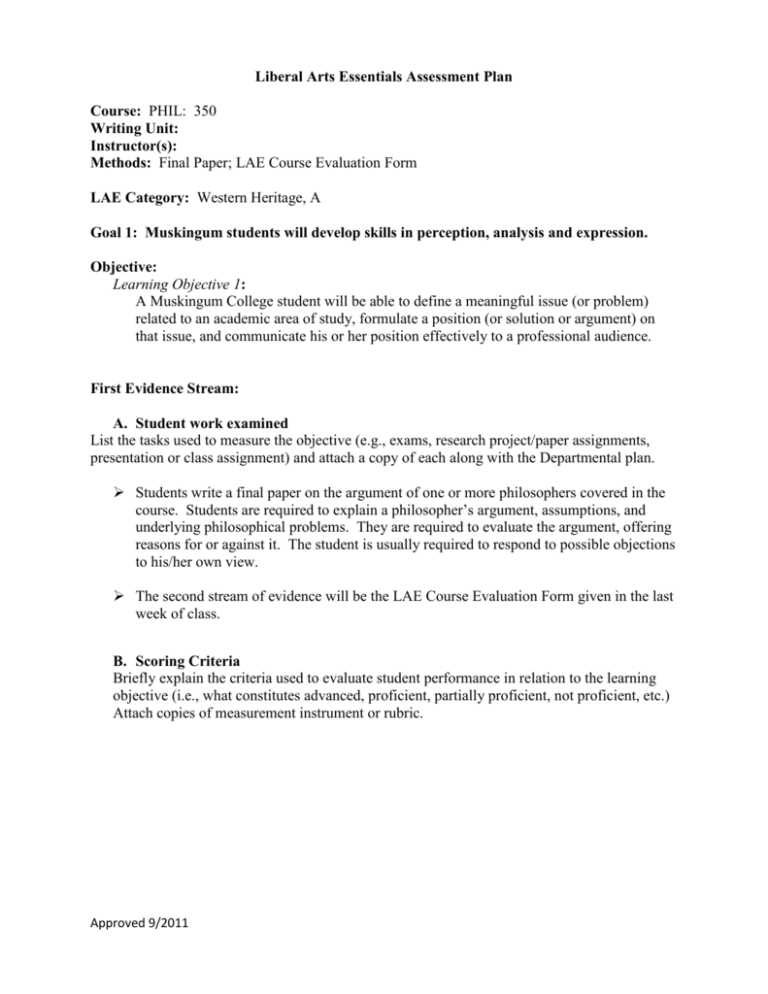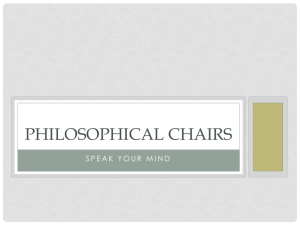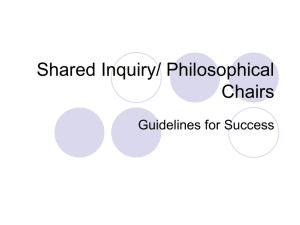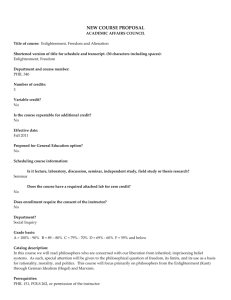PHIL3509-11
advertisement

Liberal Arts Essentials Assessment Plan Course: PHIL: 350 Writing Unit: Instructor(s): Methods: Final Paper; LAE Course Evaluation Form LAE Category: Western Heritage, A Goal 1: Muskingum students will develop skills in perception, analysis and expression. Objective: Learning Objective 1: A Muskingum College student will be able to define a meaningful issue (or problem) related to an academic area of study, formulate a position (or solution or argument) on that issue, and communicate his or her position effectively to a professional audience. First Evidence Stream: A. Student work examined List the tasks used to measure the objective (e.g., exams, research project/paper assignments, presentation or class assignment) and attach a copy of each along with the Departmental plan. Students write a final paper on the argument of one or more philosophers covered in the course. Students are required to explain a philosopher’s argument, assumptions, and underlying philosophical problems. They are required to evaluate the argument, offering reasons for or against it. The student is usually required to respond to possible objections to his/her own view. The second stream of evidence will be the LAE Course Evaluation Form given in the last week of class. B. Scoring Criteria Briefly explain the criteria used to evaluate student performance in relation to the learning objective (i.e., what constitutes advanced, proficient, partially proficient, not proficient, etc.) Attach copies of measurement instrument or rubric. Approved 9/2011 Final Paper Rubric Paper Objective 4 3 1) The paper The paper offers The paper offers offers an accurate a completely an interpretation interpretation of a accurate of a philosophical interpretation of philosophical argument and/or a philosophical argument and/or concept. argument and/or concept with two concept. or less minor errors and no major error (s). 2) The paper communicates the interpretation and evaluation in correct English and an organized structure. 3) The paper offers a reasoned evaluation of the philosophical argument and/or concept. The paper communicates the interpretation and evaluation in correct English with no major error(s) in grammar or structure. The paper offers a fully reasoned evaluation of the philosophical argument. The paper communicates the interpretation and evaluation with three or less major errors in grammar or structure. The paper offers a reasoned evaluation of the philosophical argument with at least one major reason for the evaluation. 2 The paper offers an interpretation of a philosophical argument and/or idea with more than two minor errors and no more than one major error (s). The paper communicates the interpretation and evaluation with more than three major errors in grammar or structure. The paper offers an evaluation of the philosophical argument with one or two minor reasons for the evaluation. 1 The paper does not offer an interpretation, or the interpretation is completely erroneous. The paper fails to communicate an interpretation and evaluation because of deep grammatical and organizational flaws. The paper does not offer an evaluation of the philosophical argument/concept due to absence of reasoned argument. Score: +_______/12 Advanced: 10-12 Proficient: 7-9 Not Proficient: 1-6 Second Evidence Stream: The course evaluation form will be used. Exceeding expectations will be defined as a student giving an average score across the four questions of 3.68 – 5.00. Meeting expectations will be defined as a student giving an average score across the four questions of 2.33 - 3.67. Failing to meet expectations will be defined as a student giving an average score across the four questions of 1 – 2.32. Approved 9/2011 Stream One Paper Example: Phil 350: Philosophy Paper Assignment #1 The main goal of these papers is to explain and evaluate the arguments from one of the major philosophers that we are covering: Kant, Hegel, Marx, Kierkegaard, Nietzsche, Emerson. These papers are due before class on the date marked “draft one.” You must submit a first draft. The optional second draft provides you with the opportunity to improve your grade. Draft one of paper one is due before class on February 1st. Submit the paper as an email attachment in Microsoft word to tlekan@muskingum.edu. You should make sure that you save the paper as “your name, draft 1, paper 1.” The default assignment is to answer one of these two questions. You are free to choose to write on another topic of your own choosing, however, you must make an office hour appointment to discuss this before you hand in the paper. Unless you do so, you are expected to write on one of the two questions below. 1) _____ Paper adequately explains Kant’s view that space and time are pure forms of intuition, showing how arithmetic and geometry allow for synthetic a priori judgments. _____ Paper explains whether Does Kant’s argument succeeds or not. _____ Paper is written in correct English. _____ Paper offers citations in proper format. 2) ______ Paper explains Kant’s view that causality is a category that makes experience possible, but is not derived from experience. Paper shows how this is supposed to support the idea that we have synthetic a priori knowledge of the laws of nature. _____ Paper explains whether Kant’s argument succeeds or not. _____ Paper is written in correct English. _____ Paper offers citations in proper format. THE FIRST STEP OF THE PAPER IS TO EXPLAIN PHILOSPOHICAL ARGUMENTS ON SOME TOPIC. This step will involve some degree of interpretation of the philosophical texts. View your task as quoting the philosopher, and then offering an explanation of what he is trying to say in your own words. 6/11 Approved 9/2011 THE SECOND STEP OF THE PAPER IS TO EVALUATE the argument. Does it seem right or wrong? Does it seem flawed in some way? What could be done to improve the approach? What examples might support or contradict the idea offered by the philosopher. Special 350 Requirements 1) The main goal of this paper is to interpret and evaluate the arguments and ideas presented in the texts of the philosophers. Therefore, most of your focus should be on the actual texts by the authors Kant, Hegel, Marx, Kierkegaard, Emerson, or Nietzsche. If you do choose to bring in some of the explanatory secondary literature in our packet by Schacht, Marcuse or others, you should do so sparingly. 2) If you wish to incorporate ANY secondary sources, you must present these sources to the instructor during an office hour appointment. Please note that use of secondary sources (web sites, books) without prior approval may result in a failing grade. Approved 9/2011







